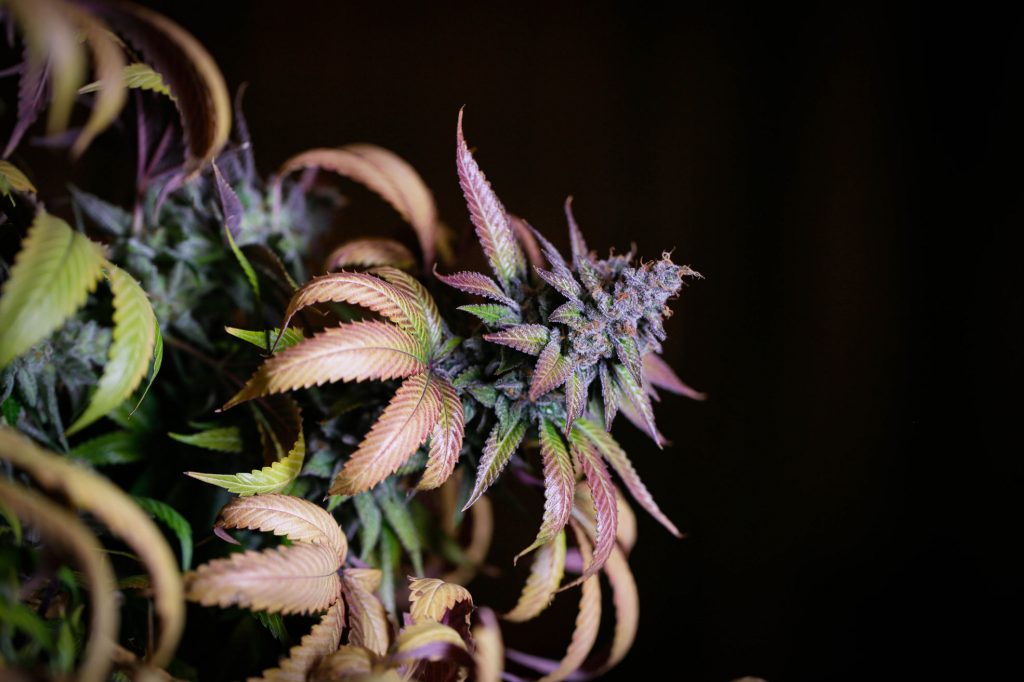by Dan Ketchum
As a cannabis enthusiast, there’s a good chance you’ve noticed THCv bubbling up in popularity — and as it turns out, there may just be a very good reason for that. While this unique cannabinoid’s appetite-suppressing effects have it buzzing in fad-diet circles, cannabis researchers have found that THCv offers an appealing one-two combo of a distinct type of high, compared with THC, as well as a potential wealth of beneficial health effects.
We’re still learning about THCv, but one thing is nearly certain: If you’re already well-versed in cannabis, it might be time to explore a new strain.
What Is THCv?
Like tetrahydrocannabinol (THC), tetrahydrocannabivarin (THCv) is a psychoactive compound found in the cannabis plant. In fact, the two compounds share a very similar cannabinoid makeup. Structurally, THCv simply sports a longer hydrocarbon chain than THC. However, as Analytical Cannabis notes, the two cannabinoids are derived from different parent molecules, tend to produce very different effects at different doses and naturally occur at drastically different levels in the cannabis plant.
What Makes THCv Unique?
THCv is more than just THC with an extra lowercase letter. According to the cannabis testing and analytics team at Steep Hill Labs, THCv differs from THC in that it produces a stronger psychoactive sensation with a shorter lasting duration, sometimes just half as long as THC. This soaring-but-short experience could be why the lab dubs THCv “the sports car of cannabinoids.”
Unique, characteristic THCv effects impact your high by producing what is often described as a more clear-headed and psychedelic experience in comparison to that of THC. High Times corroborates this, noting that cannabis strains high in THCv tend to produce more euphoric highs, often particularly effective at de-stressing and easing anxious feelings.
Examining the Data
Hard research on the mental and physical effects of THCv is ongoing, but we already have a fair amount of interesting and heartening leads, many of which examine potential health benefits. For instance:
- In a 2017 collective data review, Steep Hill reported a wide range of THCv benefits including the possible reduction of anxiety, stress and panic attack symptoms; potentially lessened Parkinson’s-related tremors; and evidence pointing toward bone cell growth. However, the lab also confirms that THCv may have an anorectic effect, which means it has the potential to suppress the appetite — this is why it’s often referred to as “diet weed” or “skinny weed.” As such, cannabis users who struggle with eating habits should approach with caution.
- In 2020, data from the Journal of Cannabis Research reported potential neuroprotective, appetite suppressant and metabolism regulating effects.
- A small 2015 study from the Journal of Psychopharmacology finds that while THCv may inhibit some effects of THC while enhancing others, 90% of cannabis users found THCv to produce a subjectively stronger sensation.
- 2014 data from GW Pharmaceuticals indicates that THCv may regulate blood sugar levels and has the potential to reduce insulin resistance.
- A 2013 Nutrition & Diabetes report indicates that THCv may inhibit THC’s tendency to increase heart rates, making it a potentially safer choice for those who experience anxiety (as well as a possible remedy for day-to-day stress).
- In 2011, studies published in the British Journal of Pharmacology also indicate neuroprotective effects, which may be useful in treating Parkinson’s disease symptoms.
Where Can You Find THCv?
So, for the curious connoisseur, what about THCv strains that you can actually access? Because of the longstanding cultivation focus on increasing THC concentrations, THCv typically appears in small percentages, but it’s out there. Perhaps most popularly, THCv appears in the African landrace strain Durban Poison (originally, THCv was most commonly found in African landrace sativas), which yields over 0.5% THCv in a THC-dominant strain. Doug’s Varin and Pineapple Purps increase that yield, with up to 4% THCv found in the latter.
Looking for an even more accessible way to experience THCv for yourself? Our Over the Rainbow vape pen packs three THCv strains in a single pen, including Electric Lemonade, Super Silver Haze and Sweet Tangie. According to AskGrowers, those strains feature 0.45% to 0.98% THCv, 0.28% to 1.98% THCv and 0.47% to 1.77% THCv, respectively. Whether you choose Over the Rainbow, Houdini or Phantom, Mistifi’s hi-phi extraction system ensures that our pens deliver those THCv ratios just as you’d find them in the natural plant, while skipping out on stuff like added flavors, thickeners, extra oils, resins or chemicals that might dilute your experience.
Dan Ketchum is an LA-based freelance lifestyle, fashion, health and food writer with more than a decade of experience. He’s been fortunate enough to collaborate and publish with companies such as FOCL, Vitagenne, Livestrong, Reign Together, Out East Rosé, SFGate, The Seattle Times and more.
References:
High Times – What Is THCv (Tetrahydrocannabivarin) and What Does It Do?
Steep Hill, Inc. – THCv: The Sports Car of Cannabinoids
Analytical Cannabis – THCv vs. THC: What Are the Differences?
NIH National Library of Medicine – British Journal of Pharmacology: Symptom-Relieving and Neuroprotective Effects of the Phytocannabinoid THCv in Animal Models of Parkinson’s Disease
GW Pharmaceuticals – GW Pharmaceuticals Provides Update on Cannabinoid Pipeline
Nutrition & Diabetes – The Cannabinoid Tetrahydrocannabivarin (THCv) Ameliorates Insulin Sensitivity in Two Mouse Models of Obesity
AskGrowers – Electric Lemonade
AskGrowers – Super Silver Haze
AskGrowers – Tangie

